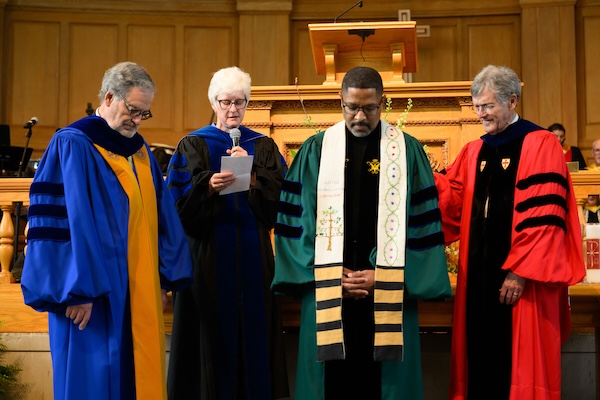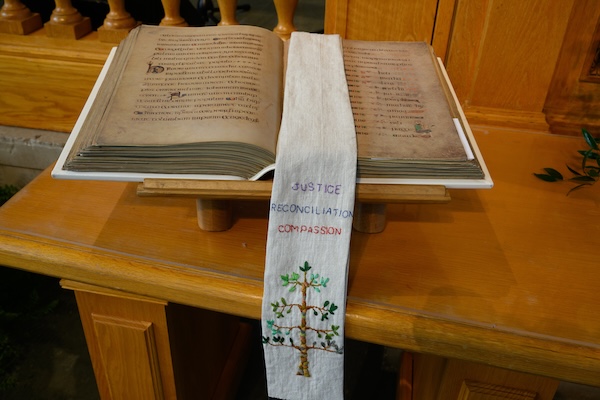THE SCHOOL OF DIVINITY celebrates its 25th anniversary this year with an expanding vision. Starting this semester, the school is offering a three-year, online Doctor of Ministry degree with several in-person residency meetings. Next academic year will bring a new, one-year Master of Religion degree. A new Initiative on Religion, Pluralism and American Public Life will focus this year on intersections of Christian and Jewish thought and theology, among other topics.
The developments add to a school that, since opening in 1999, has a roster of 665 graduates, mainly holders of Master of Divinity degrees but also including those who earned dual degrees in law, education, counseling, bioethics and sustainability. Along with the dean, there are 13 full-time faculty members.
Corey D. B. Walker (P ’25) became dean of the School of Divinity in September 2023. Founder of Wake Forest’s African American Studies Program and a scholar of religion, he has published broadly on religion and American public life; African American religion and philosophy; and African American history and culture. He accepted a celebrated appointment as a Phi Beta Kappa Visiting Scholar in 2023-24 to deliver lectures across the country. Among his topics: ethics and the environment, and religion and American public life.
Maria Henson (’82) of Wake Forest Magazine talked with Walker about the roots of the divinity school and its place in the University and community. Walker’s remarks have been edited for brevity and clarity.

Gathering in Wait Chapel in April for the formal installation of Corey D. B. Walker (P ’25) as dean of the divinity school were, left to right, Thomas Frank, retired WFU history professor and husband of the late Gail O’Day, who was divinity school dean from 2010 to 2018; Jill Y. Crainshaw (’84), the school’s vice dean for faculty development and academic initiatives; Walker; and Bill J. Leonard, founding dean and professor of divinity emeritus.
The history of the divinity school
The divinity school was unique because Wake did not want to follow other divinity schools. … It did not seek to imitate or mimic other divinity schools (or be) a one-response answer to all of the challenges in society. Instead, there was a commitment to create a divinity school that was uniquely Wake Forest. … And the unique vision was to create a divinity school that had at its core the insistence of Pro Humanitate and a divinity school that spoke to the core educational values and commitments of the University, meaning it was graduate theological education predicated on the best of the liberal arts, predicated on the best of conversations that draw from our graduate, professional schools in medicine, law and business.
So, we would train a new generation of faith leaders who were conversant with other professionals across other graduate and theological schools and who were able to be leaders in the public square. We’re not only committed to congregations, but most importantly, we’re committed to broad communities.
Remembering an intellectual architect of the school in the mid-1990s
Walter Harrelson (P ’64) (former dean of the University of Chicago and Vanderbilt University divinity schools) came here and developed the scope, the curriculum, what would be distinctive about the divinity school, and also helped identify and recruit Bill (Leonard) to come as the founding dean of the divinity school. … There were a number of different ideas that Walter was able to assess (about) the landscape of graduate theological education, from bringing the knowledge from his time at Chicago and Vanderbilt, and then recognizing the uniqueness of what Wake Forest offers — its deep values, deep humanistic values, the ability to have and prepare graduate theological students in a broad, interdisciplinary manner. (The idea was) to really create a cohesive intellectual community whereby faith commitments (and) ethical orientations are not ancillary to the formation of leaders in society but quite central to it.

The divinity school defines its mission “as an ecumenical community committed to justice, reconciliation and compassion.”
The school’s distinctiveness
It was always nondenominational. It was always open and affirming. It was one of the few divinity schools that was started intentionally without denominational affiliation.
How alumni serve in the world
They are engaged in congregational ministry, and that’s broadly ecumenical. We have folks who graduated here who are now professors at universities or … chaplains at universities. We have folks who combined ministry and law and actively practice law. We have (graduates) … who are some of the leading social justice advocates across the nation. We have folks who work at the Baptist Joint Committee (for Religious Liberty, based in Washington, D.C.). … Those alumni touch all walks of life in everyday life. And on Sundays.
The divinity school’s new Initiative on Religion, Pluralism and American Public Life
The idea of it is to build on the rich tapestry and rich history and heritage of American religious pluralism, and then to develop and excavate those resources that can then enable us to broaden and deepen our democratic lives and enhance our society toward a more thriving, more just and more humane future for all. These thick, intellectual questions will be opportunities for scholars to come to Wake Forest (and) for the broad public to engage … leading minds that are here at Wake Forest and across the nation. (The initiative is) to be an intellectual leader and a thought leader around the complexities of religion and American public life, which can then help groups and communities across the nation navigate our contested time. …
We have the convening capacity. We have the intellectual leadership, and we have the ethical grounding to serve as the premier space where those contentious issues are engaged in their full and dynamic dimensions to begin to think through, “What are some responses that will enhance American democracy?” …
Part of it is for us to begin to create those reflective spaces where citizens can come listen to these ideas and take them back to their communities and say, “Well, I heard this that day, and this gives me a different insight, a different perspective, a different orientation and understanding” — that’s the University at its best. Opening up new possibilities. Opening up individuals to new ideas. Raising levels of critical consciousness so that we understand that knowledge begins not in certainty but in wonder.
To support endowed scholarships, please contact Hannah McMahan King (’06, MDiv ’09), the divinity school’s assistant dean of development, at kinghm@wfu.edu


